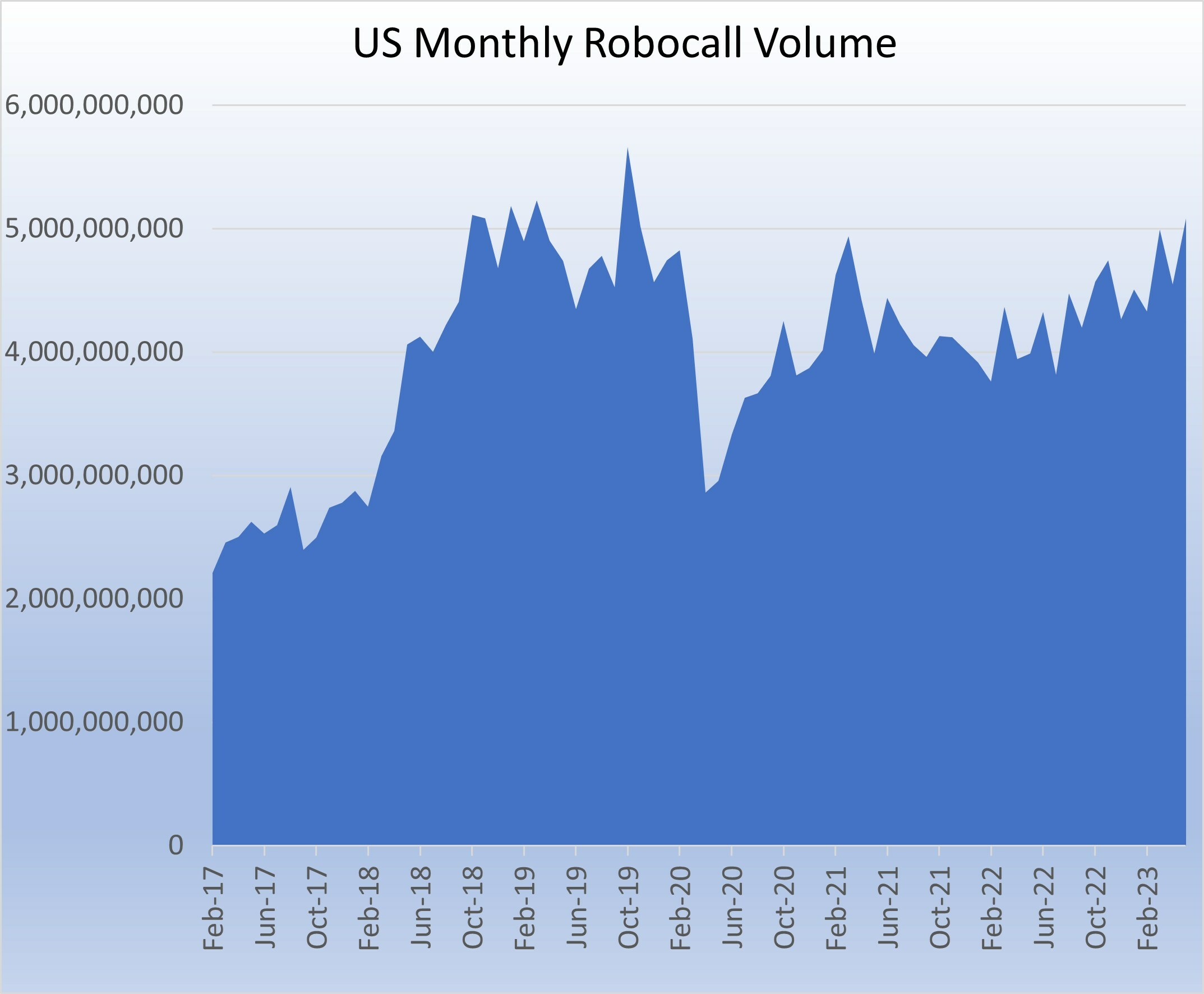U.S. consumers received almost 5.1 billion robocalls in May, representing an 11.8% increase from April’s volume. This exceeds the 5 billion calls/month milestone for the first time since December 2019.
The month of May averaged 163.9 million robocalls/day, and 1898 robocalls/second. This was up 8.2% from April’s 151.6 million robocalls/day and 1755 robocalls/second.

Over the past 12 months, Americans have received roughly 53.9 billion robocalls.
“May’s volume exceeding 5 billion calls per month is surprising, given the increase in enforcement efforts and the moves to force carriers to police their networks,” said YouMail CEO Alex Quilici. “Unfortunately, consumers still need to protect themselves with robocall blocking apps like YouMail as the problem remains remarkably stubborn.”
These latest figures are provided by YouMail, a totally free robocall blocking app and call protection service for mobile phones. The figures are determined by extrapolating from the robocall traffic attempting to get through to YouMail’s millions of active users.
Most Unwanted Robocall in May: Government Grant Telemarketing
Like April, the month of May continued to see large numbers of telemarketing calls that appeared to be pitching ways for businesses to get significant funds for employees they kept on payroll during the pandemic. In the month, the calls left the identical voicemail message from “Crystal Allen” as in this example:
Hi, it’s Crystal Allen following up with your refund. Today is May 2. It still looks here like your business will most likely receive a refund of up to $26,000 for every employee you kept on payroll during the years 2020 and or 2021. You do not have to pay this money back, so it is not a loan. Just call me back at 866-371-4212 that’s 866-371-4212. Thanks, and I look forward to answering any questions.
This call came from many thousands of different numbers, and it appeared to be in the many tens of millions of calls. Further, this call appeared to be violating various telemarketing regulations, as well as calling countless people who did not give prior consent and do not have any business relationship with this firm, including consumers with no ownership in a business to whom the promotion would not be relevant.
May’s Unwanted Call Volume Was Up Significantly
Americans received over 2.2 billion unwanted scam and telemarketing calls in May, up roughly 10% from April. This was primarily driven by 17% increase in Scam calls. Notification and payment reminders also increased significantly during the month.
|
Type of Robocall |
Estimated May Robocalls |
Percentage May |
|
Notifications |
1.70 billion (+13.5%) |
33% (flat) |
|
Payment Reminders |
1.18 billion (+12.9%) |
23% (flat) |
|
Telemarketing |
1.33 billion (+7.3%) |
26% (-1%) |
|
Scams |
0.87 billion (+17.2%) |
17% (+1%) |
Some calls initially viewed as telemarketing are eventually recognized as illegal telemarketing or scam calls, so it’s important to measure the overall quantity of scam and spam calls combined. A scam call is one that contains clearly illegal or fraudulent behavior, such as a call from an enterprise imposter, or one that has a spoofed caller ID. Stir/Shaken continues to reduce the number of robocall campaigns based on spoofed IDs, which drives down the number of obvious scam calls by making them harder to detect, since they appear to be telemarketing campaigns unless there is other evidence of fraud.
“Winners” in May 2023
The top cities, area codes, and states with the most robocalls and robocalls/person remained mostly unchanged from April. The one exception is that Dallas’s 214 area code surpassed Atlanta’s 678 area code for 3rd most robocalled area code, given Texas two out of the top three most robocalled area codes.
|
Cities with the Most Robocalls: |
Atlanta, GA (192.5 million, +10%) Dallas, TX (180.9 million, +11%) Chicago, IL (165.1 million, +8%) |
|
Cities with the Most Robocalls/Person: |
Baton Rouge, LA (49.8/person, +13%) Memphis, TN (40.8/person, +10%) Washington, DC (33.8/person, +11%) |
|
Area Codes with the Most Robocalls: |
404 in Atlanta, GA (80.9 million, +12%) 832 in Houston, TX (69.7 million, +12%) 214, Dallas, TX (49.4 million, +10%) |
|
Area Codes with the Most Robocalls/Person: |
404 in Atlanta, GA (66.2/person, +12%) 225 in Baton Rouge, LA (49.8/person, +13%) 857 in Boston (44.2/person, +13%) |
|
State with the Most Robocalls: |
Texas (599.2 million, +11%) California (456.4 million, +11%) Florida (410.2 million, +11%) |
|
State with the Most Robocalls/Person: |
Louisiana (31.7/person, +12%) South Carolina (29.9/person, +12%) Alabama (26/5/person, +11%) |
These data points are provided by YouMail, a free call protection app for mobile phones. YouMail won the American Business Awards’ Gold Stevie Award for Technical Innovation of the Year, and the YouMail app was named the nation’s best robocall-blocking solution in a competition organized by Geoffrey Fowler of the Washington Post.
YouMail blocks unwanted robocallers by making sure the user’s phone doesn’t ring, and then plays an out-of-service message that leads them to think they dialed an invalid number. YouMail identifies problematic numbers and robocalls using a combination of its recently patented audio fingerprinting technology, call patterns, and consumer feedback.
YouMail provides the YouMail Robocall Index to estimate robocall volume across the country and for specific area codes every month. This estimate is formed by extrapolating from the behavior of the billions of calls YouMail has handled for its users, and these statistics are regularly cited by the FCC as a definitive source for national data trends.
For a full ranking of cities, states and area codes, as well as details on the behavior of robocallers in each area code, please see the robocall Index HERE. To listen to actual voice messages left by robocallers, please visit the YouMail Directory HERE. Visit the YouMail website for more information HERE.
Related News:
Advanced Mobile Threat Detection Unveiled by Bitdefender
Weave Launches Softphones to Help SMBs Better Leverage Remote Staff

